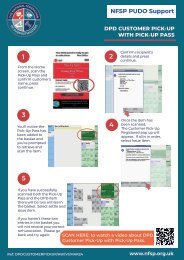THE SUBPOSTMASTER - JUNE ISSUE
June's issue of the The SubPostmaster magazine
June's issue of the The SubPostmaster magazine
You also want an ePaper? Increase the reach of your titles
YUMPU automatically turns print PDFs into web optimized ePapers that Google loves.
Your letters<br />
“More needs<br />
to be done to<br />
cover<br />
postmasters’<br />
operational<br />
costs”<br />
and other factors. Whilst<br />
these announced<br />
increases and potential<br />
increases are more than<br />
welcome, what is needed<br />
is new profitable products<br />
and services as well as the<br />
flow through from<br />
improvements in head<br />
office cost control and the<br />
reduction of other backoffice<br />
costs.<br />
A recognition by PO that<br />
postmasters operate<br />
businesses and need<br />
sufficient advance<br />
information upon which to<br />
plan for the future, which<br />
might include, for<br />
example, improvements to<br />
post office layout, decor<br />
and staffing levels is<br />
required. Cash flow is a<br />
major element in this<br />
planning. Profit is one<br />
thing, but cash flow is so<br />
important.<br />
Whilst steps to improve<br />
postmaster remuneration<br />
are welcome, more needs<br />
to be done to cover<br />
operational costs to<br />
ensure that postmasters<br />
themselves receive<br />
adequate compensation<br />
for their hard work.<br />
Why the<br />
difference in<br />
commission?<br />
Local branches do the<br />
same work as Main<br />
branches so when will they<br />
be paid the same<br />
commission? For example,<br />
does Post Office Ltd get<br />
paid the same for a 1st<br />
class parcel if it has been<br />
sent from a Main or a<br />
Local? If so, why is there a<br />
difference in commission?<br />
Zafar Rushnaiwala<br />
Holts PO<br />
POST OFFICE REPLIES<br />
Paul Liddiard, Head of<br />
Postmaster<br />
Remuneration<br />
Development, writes:<br />
Thank you for your<br />
questions.<br />
It is entirely normal in a<br />
large-scale franchise<br />
business that there might<br />
be differing contracts for<br />
franchisees in different<br />
circumstances.<br />
Contract requirements<br />
for Main branches and<br />
Local branches are<br />
different and as such, on<br />
many products, attract<br />
differing levels of<br />
remuneration. The core<br />
differences are the<br />
requirements for Main<br />
branches to provide<br />
HR4UK Quarter page ad June 2024 SPM.pdf 7 22/05/2024 13:26<br />
dedicated<br />
areas of the<br />
branch to Post<br />
Office activities, including<br />
dedicated queuing areas,<br />
and also the need for<br />
dedicated staff. In<br />
“Contract<br />
requirements<br />
for Main branches<br />
and Local<br />
branches are<br />
different”<br />
contrast, Local<br />
branches will<br />
usually be set up to<br />
share both space and staff<br />
between the post office<br />
and retail parts of the<br />
business.<br />
C<br />
M<br />
Y<br />
CM<br />
MY<br />
CY<br />
CMY<br />
K<br />
HR<br />
*You must be logged into the members’ area of the NFSP website.<br />
Understanding Casual<br />
Worker Agreements<br />
Casual worker agreements offer valuable<br />
flexibility for UK businesses but come with<br />
their set of challenges. Employers must<br />
carefully consider the legal framework<br />
and ensure they maintain fair, transparent<br />
practices.<br />
Scan the QR code to read our<br />
full article.*<br />
30<br />
The SubPostmaster June 2024

















